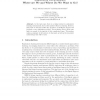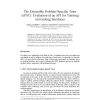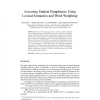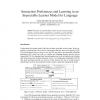107
click to vote
AIED
2009
Springer
15 years 9 months ago
2009
Springer
Students use both domain-dependent strategies (such as seeking specific domain help) and domain-independent strategies (such as relaxation exercises) to help regulate their affecti...
106
click to vote
AIED
2009
Springer
15 years 9 months ago
2009
Springer
This study, through the ontological engineering approach, aims at building a conceptual basis that encourages instructional designers in better understanding of learning/instructio...
106
click to vote
AIED
2009
Springer
15 years 9 months ago
2009
Springer
In the last years, there is a rising interest in exploratory learning environments, due to their positive effects on learning. However, their lack of structure makes the provision...
95
Voted
AIED
2009
Springer
15 years 9 months ago
2009
Springer
The Extensible Problem-Specific Tutor (xPST) system was created to facilitate the creation of intelligent tutoring systems (ITSs) on existing software and web-based interfaces. Thi...
110
Voted
AIED
2009
Springer
15 years 9 months ago
2009
Springer
This paper explores the role that feedback based on past actions and motivational states of the learner can have in a motivationally and metacognitively aware Intelligent Tutoring ...
128
click to vote
AIED
2009
Springer
15 years 9 months ago
2009
Springer
Affect has been the subject of increasing attention in cognitive accounts of learning. Many intelligent tutoring systems now seek to adapt pedagogy to student affective and motivat...
130
click to vote
AIED
2009
Springer
15 years 9 months ago
2009
Springer
We present in this paper an approach to assessing student paraphrases in the intelligent tutoring system iSTART. The approach is based on measuring the semantic similarity between ...
107
Voted
AIED
2009
Springer
15 years 9 months ago
2009
Springer
Inquiry learning involves the learner acquiring new concepts and skills by means of carrying out an investigation. Some previous studies have looked into how these learning activit...
125
click to vote
AIED
2009
Springer
15 years 9 months ago
2009
Springer
We present an inspectable learner model to prompt noticing in language learning, considering interaction preferences. Four patterns of model inspection were seen, but most students...
99
Voted
AIED
2009
Springer
15 years 9 months ago
2009
Springer
Abstract. This paper presents a methodology for automatically customizing a scenario to suit a learner’s abilities, needs, or goals. Training scenarios are often utilized to give...




